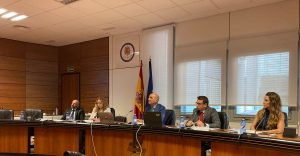
06/10/2022
A Lebanese political delegation, headed by the Secretary General of the Council of Ministers, Mahmoud Makié, has visited various Spanish institutions to learn first-hand about Spain's experience in the fight against terrorism
The visit, which is part of the ACT-Advance Counter Terrorism for Lebanon Security project, financed by the European Union and co-led by the FIIAPP, has shown the Lebanese delegation the best practices and lessons learned from the Spanish model in the fight against terrorism, specifically in terms of coordination, investigation and judicial process.

The meetings began with a meeting with the Minister of the Interior, Fernando Grande-Marlaska, and over two days, the delegation visited the management of the National Centre for the Protection of Critical Infrastructure (CNPIC), the management of the Intelligence Centre against Terrorism and Organised Crime (CITCO), the presidency of the National High Court and held meetings with the heads of the General Information Commissariat, the National Police Intelligence Centre and the Department of National Security. The high-level agenda, which will be followed by a more technical study visit, concluded with a meeting with the Minister of the Presidency, Félix Bolaños.
Mahmoud Makié pointed out that “for us, this project represents a major partner in addressing the Lebanese National Strategy for the fight against terrorism and organised crime, the management of the Disaster Body in Lebanon and the development of a mechanism to activate cooperation between different administrations and competent bodies”.

For his part, the Team Leader of the project, Inspector Jesús Arias, remarked that “with this visit we intend to share with the Lebanese authorities the existing structures in our country in the prevention, fight and protection against acts of terrorism. This is the only project of its kind in Lebanon and as a CNP Inspector I am very grateful to this ministry for its collaboration and advice on strategic issues such as the preparation of a National Counter-Terrorism Strategy, the reform of the counter-terrorism legal framework and a system for the identification and protection of critical infrastructures”.
The first objective of the project is the development of a national counter-terrorism strategy; including the definition and designation of critical infrastructures and plans to protect them, the reform of the related legal framework and the improvement of coordination systems between intelligence agencies.
The second objective, focusing on cyber security, foresees the creation of a national cyber security system, including the establishment of a cyber security training centre, training in cyber risk assessment, crisis management, digital forensics and digital threat investigation.
The third component is entirely oriented towards a human rights approach and includes specific training for security institutions, the promotion of dialogue with civil society and the strengthening of the operational capacities of the National Human Rights Commission. The project has the decisive involvement of the Spanish Embassy in Lebanon.

The director of the project, Koussay Boulaich, stressed that “Spain plays a crucial role in the implementation of this delegated cooperation project by advising an inter-ministerial commission made up of some fifteen actors including the ministries of foreign affairs, interior, defence, justice, intelligence agencies and private entities, under the leadership of the Secretary General of the Council of Ministers. This is a pioneering project that strengthens the Lebanese government’s capabilities in counterterrorism, cybersecurity and the promotion of human rights”.
Lebanon is currently in the midst of a triple crisis: economic-financial (devalued currency, soaring inflation), political and social (80% of the population living in poverty), while recovering from the impact of COVID 19, the Beirut port explosions of 4 August 2020 and the aftermath of a decade of war in neighbouring Syria. In this context, criminal networks are multiplying along air and sea routes, favouring the recruitment of new terrorists. Lebanon needs to address this phenomenon by strengthening its capacities to react to the new threats of terrorism and organised crime, while promoting the rule of law and human rights in accordance with international standards.
Lebanon is particularly interested in learning in depth about the system of coordination of the National Court with intelligence agencies and law enforcement agencies, and a technical seminar will be organised in October focusing on the mechanisms of coordination and exchange of information between courts and intelligence agencies.


